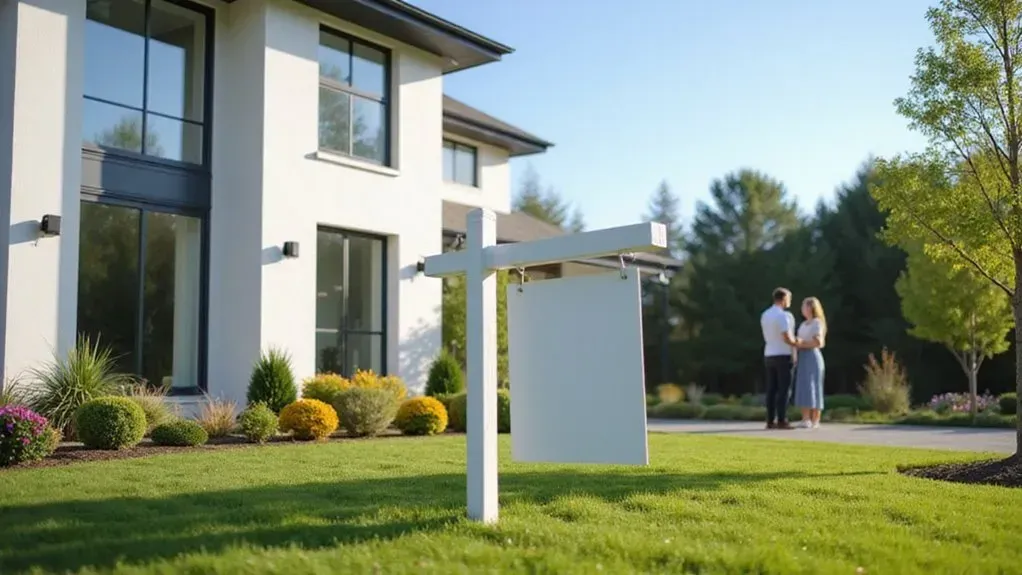
Navigating the murky waters of probate while trying to sell inherited property leaves many executors overwhelmed. Dealing with courts, beneficiaries, and legal requirements creates stress during an already emotional time. Our comprehensive guide simplifies the probate property sale process so you can proceed with confidence.
selling your house during probate is possible but requires court approval and specific legal procedures. You must notify beneficiaries and creditors, obtain professional appraisals, and petition the court before proceeding with any sale.
In this guide, I will explore everything you need to know about selling houses in probate.
Key Takeaways
- Selling a house in probate requires court approval and must meet specific legal and appraisal requirements.
- Probate sales can be court-confirmed or private, with court approval needed for formal transactions.
- The process involves submitting a sale petition, appraisals, a confirmation hearing, and possibly bidding at auction.
- Financial considerations include executor fees, commissions, taxes, and settling liens before distributing proceeds.
- The timeline is extended due to legal steps, but clear communication and proper procedures facilitate smoother sales.
What is Probate and How Does it Affect Home Sales?

Probate is the legal process that validates a will and oversees asset distribution after someone dies.
Court supervision ensures debts are paid and property transfers to rightful heirs according to state laws. This directly impacts home sales because the executor needs court permission to sell any real estate.
The process typically extends the timeline for selling a home. Additionally, potential buyers should prepare for more paperwork and possible delays.
However, many families successfully navigate this process with proper guidance. For a smooth transaction, clear communication between all parties remains essential.
Most importantly, proper property appraisals help establish fair market value. This approach serves families best during a challenging time.
Can You Legally Sell a House During Probate?

Yes, you can sell a house during probate, but only with court approval. The process requires formal notification to all beneficiaries and creditors. The executor must manage the sale transparently. Courts oversee these transactions carefully.
The sale price typically must reach at least 90% of the appraised property value. After the sale completes, the money follows a specific order. Furthermore, the proceeds first pay outstanding debts and taxes. Any remaining funds then go to the heirs.
In most cases, the court wants to ensure fair market value. Additionally, all interested parties must receive proper notification before the sale proceeds.
What Are the Types of Probate Sales?

There are two main types of probate sales: court-confirmed sales and private sales. Court-confirmed sales require court approval and often involve auctions, while private sales let the executor negotiate directly with buyers.
Choosing the right type can impact the sale timeline and process, so it’s important to understand your options.
Formal Probate Sale Process
Formal probate sales require court oversight and approval to protect all beneficiaries. There are two main types: traditional sales and court-confirmed sales. The process demands official appraisals to establish fair market value. Courts supervise these transactions to ensure fairness for all parties involved.
The court must approve all terms before the sale can be finalized. This oversight helps prevent undervalued transactions that might harm heirs’ interests. Furthermore, specific requirements must be met throughout the entire selling procedure.
As a result, formal probate sales take longer than regular real estate transactions. However, this thorough process provides important protections for everyone with inheritance rights.
Informal Probate Sale Options
Informal probate sales let you sell property during probate without court approval. These sales move faster than court-supervised transactions. You must confirm all estate assets are clear of liens before proceeding.
Always settle outstanding debts first to prevent complications later. Proper notification to all beneficiaries is legally required. Furthermore, you must disclose the property’s condition to potential buyers.
Following these steps protects everyone involved. The process safeguards beneficiary interests while enabling a quicker sale. Estate laws vary by state, so consult with a probate attorney before starting any sale.
Independent Administration Sales
Independent administration sales let executors sell probate property without court approval. This streamlined process allows faster transactions with fewer legal hurdles. Executors can negotiate and accept offers on their own terms.
Court involvement decreases significantly under this method, which often results in quicker closings. The executor maintains control throughout the sale process. This approach benefits all parties through reduced waiting periods.
Moreover, independent administration creates flexibility when managing inherited property sale. Beneficiaries typically receive proceeds faster. The executor can respond to market conditions more effectively.
How to Sell a House in Probate?
To sell a house in probate, you need court approval first, so your first step is to petition and get that permission.
Next, you’ll have to have the property appraised to determine its fair market value before listing it.
Once you receive offers, the court will review and confirm the sale at a hearing before closing the deal.
Obtaining Court Permission
Executors must receive court approval before selling probate property. The process starts with submitting a detailed sale petition to the probate court.
An independent appraisal report must accompany this petition. The sale price can’t be less than 90% of the appraised value.
Finally, the executor attends a confirmation hearing where the court reviews the sale details.
This legal procedure protects all beneficiaries of the estate. Furthermore, it ensures the property sells for a fair market value. The court’s oversight prevents potential conflicts or disputes among heirs.
Property Valuation and Appraisal
Property valuation requires a licensed appraiser for probate sales. A formal appraisal determines fair market value and meets court requirements. Your sale price typically must reach at least 90% of the appraised value.
Courts generally expect probate properties to be priced at 90% of appraised value. This practice protects the estate from undervaluing assets. Accurate valuations also help prevent disputes among beneficiaries.
Furthermore, professional appraisals provide documentation for tax purposes. This paperwork supports the executor’s fiduciary duty to the estate.
Most importantly, proper valuation creates a smooth probate process for everyone involved.
Marketing the Probate Property
Effective marketing strategies help sell probate properties quickly and at fair prices. Choose real estate agents with probate experience who understand court requirements and timelines.
Property must be listed at minimum 90% of its appraised value to meet legal requirements.
The home should be clean and presentable before showings. Make necessary minor repairs to improve first impressions.
Furthermore, utilize both traditional methods and online platforms to reach potential buyers.
As a final consideration, all marketing approaches need court approval before implementation. This ensures compliance with probate regulations while maximizing exposure to qualified buyers in the marketplace.
Reviewing and Accepting Offers
The executor reviews and accepts offers on probate properties. They must check that offers meet legal requirements. Offers can’t be less than 90% of the appraised value.
Comparing multiple offers helps find the most favorable terms. Court approval is necessary before finalizing any sale. The executor petitions the court after selecting an offer.
The court examines whether the offer is fair and follows legal guidelines. This process protects all beneficiaries’ interests. Proper documentation speeds up the approval process. Executors should maintain clear records of all offers received.
Court Confirmation Hearing
A court confirmation hearing finalizes the sale of a probate property. The judge reviews all details to protect heirs and ensure legal compliance.
Multiple buyers can bid during this hearing, often through an auction format. Each bidder must provide at least 10% earnest money to participate.
The final sale price must reach minimum 90% of the property’s appraised value. This requirement safeguards beneficiary interests.
The executor presents final bids to the court for approval. Once confirmed, the sale proceeds to closing. This hearing represents the final major hurdle in the probate sales process.
Closing the Sale
Probate house sales conclude when the court approves final terms. The executor must obtain this approval before proceeding. Court confirmation ensures the transaction complies with legal requirements.
Sale proceeds first pay off existing debts, taxes, and administrative expenses. After these obligations are satisfied, remaining funds go to the beneficiaries named in the will. This structured approach protects all parties involved in the transaction.
Furthermore, the court’s oversight prevents potential disputes among heirs. Probate closings typically take longer than standard real estate transactions due to legal requirements.
What Are the Challenges of Selling a Probate House?
Selling a probate house involves navigating legal hurdles and delays. Court approval requirements create longer timelines and generate extensive paperwork.
Family conflicts often arise when multiple heirs disagree about the sale. Courts typically require probate properties to sell for at least 90% of their appraised value. This price restriction can limit buyer interest.
Additional expenses include attorney fees, court costs, and probate filing charges. Furthermore, probate homes sell “as-is” with minimal improvements. This condition status frequently deters potential buyers who prefer move-in ready properties.
During this complex process, proper disclosure remains essential for legal compliance and buyer satisfaction.
How Long Does it Take to Sell a House in Probate?
Selling a house in probate typically takes three months to several years. The timeline depends on estate complexity and local court processes.
Courts must approve probate sales, which often extends the timeline by weeks or months.
Estate disputes significantly impact how quickly you can sell. Family disagreements or creditor claims may delay proceedings.
Additionally, the property must undergo appraisal before offers can be considered. Executor efficiency plays a crucial role in the timeline. A well-organized executor can move the process forward smoothly.
In contrast, an unprepared one might cause unnecessary delays. As a result, selecting an experienced probate attorney can be valuable.
What Are the Financial Implications of Probate Sales?
When selling a probate property, you’ll face several financial considerations, including executor fees, attorney costs, and court fees.
You’ll also need to settle any outstanding mortgages or liens before distributing proceeds. Understanding these expenses helps you plan for the actual amount beneficiaries will receive after all obligations are met.
Executor Fees and Commissions
Executors receive payment for managing estate assets through the probate process. Executor fees typically range from 2% to 5% of the estate’s value.
Real estate commissions add another 5% to 6% when selling property. These costs directly impact inheritance amounts for beneficiaries.
Additional expenses include legal fees, court costs, and professional appraisals. Smart executors track all expenses carefully. Proper record-keeping prevents disputes and ensures transparency with heirs.
Furthermore, some states regulate maximum executor compensation by law. Before selling estate property, calculate all potential costs. This preparation helps beneficiaries understand final distribution amounts.
In many cases, executors can negotiate lower commission rates with real estate professionals.
Attorney Costs
Probate attorney fees typically range from $2,000 to $7,000, depending on estate complexity. Most lawyers charge hourly rates between $150-$500 per hour. Your total cost will include the attorney’s time plus additional expenses.
These extra costs can significantly reduce the estate’s value. Appraisals cost $500-$1,000 for proper property valuation. Court filings and legal notices add another $200-$1,000 in required fees.
Furthermore, complex estates with multiple assets or beneficiary disputes may incur higher costs.
When budgeting for probate, account for all these potential expenses. The combined total often reaches thousands of dollars.
Court Fees
Court fees range from hundreds to thousands of dollars in probate sales. Filing fees vary by state and form a substantial part of probate costs. You’ll also pay for court hearings as part of the process.
Appraisal expenses typically cost between $500-$1,000 depending on property value.
Legal fees add another layer of expense. These may be calculated as a percentage of the estate or charged hourly.
Different states have specific laws governing fee structures for probate property sales. Furthermore, all these expenses reduce the final value distributed to heirs.
Tax Considerations
Inherited property sales have significant tax implications. The estate must pay outstanding taxes before distributing assets to beneficiaries.
Capital gains taxes may apply if the property sells for more than its inherited value. These taxes reduce the final amount beneficiaries receive.
Heirs receive a stepped-up basis on inherited property, which can minimize tax burdens. This means the property’s value is assessed at the time of inheritance rather than the original purchase price.
Furthermore, executors should consult tax professionals before finalizing sales. Estate tax thresholds vary by state and change periodically under federal law. Most estates fall below these thresholds and avoid heavy taxation.
Mortgage and Lien Settlements
Mortgages and liens must be settled before distributing estate proceeds. Estate funds must first pay off any mortgage balances and liens against the property.
All debts need clearance before beneficiaries can receive their share. This protects both creditors and heirs from future claims.
If the sale price falls below the mortgage amount, the estate must address this shortfall. The executor may need to use other estate assets or negotiate with lenders.
As a result, beneficiaries might receive less than expected. Probate property sales must follow specific legal procedures in your state. These laws safeguard everyone’s interests throughout the settlement process.
Need to Sell Your Probate House Fast? Contact Jay Primrose Properties Today
Jay Primrose Properties can help you sell your probate house quickly. We specialize in navigating probate property sales efficiently. Our team handles all legal requirements for probate sales without delays.
The probate process requires specific court approvals and documentation to legally transfer property. We manage court petitions and hearings on your behalf. This saves you time and reduces stress during an already difficult period.
Furthermore, we provide cash offers for probate properties. Your family can move forward faster with our direct buying process.
Many clients appreciate our straightforward approach and lack of complicated contingencies.
Frequently Asked Questions
Can I Sell My Parents’ House During Probate?
Yes, you can sell your parents’ house during probate, but only with court approval. You’ll need to follow legal steps, including obtaining an appraisal, notifying heirs, and getting the court’s permission before selling.
How Long After Probate Is Granted Are Funds Released?
Funds are released about 4-6 months after probate is granted, like waiting for a cake to bake. You’ll need to settle debts, taxes, and get court approval, which can extend the timeline if disputes arise.
How Long Do You Have to Wait to Sell a House After Someone Dies?
You can sell a house after someone dies once the court appoints you as the personal representative and grants approval. Typically, this takes a few weeks to several months, depending on estate complexity and court schedules.
Is There a Timeline to Settle an Estate?
Envision helping a family settle an estate; typically, it takes 9 to 24 months. You guide them through court filings, creditor claims, and distributions, ensuring respectful, timely completion, even amid disputes or delays.
Give us a call anytime at 253-697-0007 or fill out this quick form to get started today!
Get A Fair Cash Offer On Your House

About the author
Justin Baker
Justin Baker is the founder of Jay Primrose Properties, a leading cash home buying company based in Tacoma, WA. With a passion for real estate investing, Justin has helped numerous homeowners in the Pacific Northwest region sell their homes quickly and hassle-free. Justin believes that buying and selling real estate should be a seamless process and works tirelessly to ensure that his clients have a stress-free experience. With a deep understanding of the local real estate market and a commitment to exceptional customer service, Justin has established himself as a trusted and reliable cash home buyer in Tacoma and the surrounding areas.











